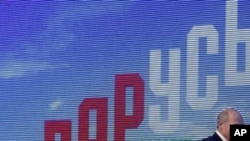One month after presidential elections disintegrated into a massive crackdown on democratic rights in Belarus, the country's president faces a rising tide of international opposition.
Alexander Lukashenko appears to be scheduling his inauguration for a fourth term as Belarus president for Friday. The timing is so hurried that no foreign leaders or journalists are expected to attend.
The burly mustachioed leader, often called the last dictator in Europe, is suddenly racing the spreading skepticism about his claim to victory in the December 19 presidential elections.
Last weekend, Markus Loening, Germany’s highest ranking envoy to visit Minsk since the vote, bluntly told the Belarus government the only way to avoid sanctions will be to release all political prisoners and to hold new elections.
The European Parliament is expected to approve a resolution calling for a free and fair repeat of the presidential vote. The resolution will also condemn the ongoing wave of arrests in Belarus, a crackdown that jailed seven of the nine opposition candidates.
In neighboring Poland, the vicious nature of the Belarus crackdown evoked memories of 1981 when the communist government declared martial law against the Solidarity trade union movement. Backed by public opinion, Poland is doubling its spending on dissident broadcasting to Belarus, is opening universities to students expelled from Belarus universities, and has abolished visa fees for Belarussians.
Polish media reports Warsaw has banned travel to Poland by President Lukashenko and top government members.
On January 31, EU foreign ministers are expected to approve similar travel bans for all 27 member nations.
European Council on Foreign Relations Belarus expert Jana Kobzova watches the growing sanctions movement from London. "The overall purpose of the sanctions is to punish. It is not to change the regime, it is to punish those who took part in the crackdown or who okayed the crackdown," she said.
She said the European Union wants to take clear action on Belarus, in order to gain credibility with governments that crack down on human rights in other places, such as Tunisia, Ukraine and Russia.
U.S. Secretary of State Hillary Clinton and EU foreign policy chief Catherine Ashton have issued a joint statement condemning the elections. Separately, Clinton and Ashton met recently with Belarussian human-rights activists.
In face of this growing isolation, Sovietskaya Belorussia, a government-owned newspaper, charged Friday the secret services of Germany and Poland plotted last fall to overthrow the Lukashenko government. The next day, the newspaper charged Western ambassadors encouraged the mass protest demonstration after the election.
Riot police broke the protest up so violently that Belarus’ opposition now call December 19 ‘Bloody Sunday.’ The opposition has petitioned the Guiness Book of Records to have President Lukashenko recognized for arresting a record number of presidential candidates.
Conducted by a security agency still called the KGB, the raids and arrests continue daily. KGB agents have closed an independent radio station, seized computers from human-rights groups, and threatened to disbar defense lawyers for opposition politicians. They have detained and interrogated thousands of people simply because cell phone records show they were near the protest the night of December 19.
A reporter for opposition newspaper Nasha Niva, Aleksandr Kidritsky, spoke by telephone from Minsk. "The circle of people are who are being targeted, or even better to say, affected by this wide-scale harassment, this circle is really big right now. I cannot predict when it will stop," he said.
President Lukashenko’s fear may be that economic hard times are ahead.
A former collective farm manager, he long subsidized his country’s economy by buying oil cheap from Russia and then reselling it at higher prices to Europe.
But now, the Kremlin is putting the squeeze on Belarus. Last year, Russian oil exports to Belarus dropped by 40 percent. On January 1, they stopped altogether.
Belarus’ Prime Minister Mikhail Myasnikovich is to meet Thursday with Russian Prime Minister Vladimir Putin in Moscow to try to establish a new price.
When the oil starts flowing again, it is expected to be at a price that will starve the Belarus budget of billions of dollars of subsidies. Last week, gas and gasoline prices were hiked by 10 percent.
Foreign help is not in sight. Last week, Belarus’ prime minister reported that since 2008, the national public and corporate debt of Belarus has increased 10 times.
Kobzova, the Belarus expert, said the Minsk government looked at the worsening economic picture and decided to tighten political control. "People basically stopped fearing Lukashenko and the regime the way they did before. There were so many people on the square who came not to support the opposition, but basically to express their disappointment with the system, the way the vote is always rigged, the way they do not have a say in the way the country is going. That is why the regime had to crack down - to spread the fear again," she said.
For some, this tactic is not working. The opposition, which was split among nine candidates last fall, united last week creating the National Coordination Council of the Democratic Opposition.
Charter 97, the main website of the opposition, now routinely refers to the Belarus president as ‘the usurper."
Belarus President Races Sanctions to Inauguration
- By James Brooke









